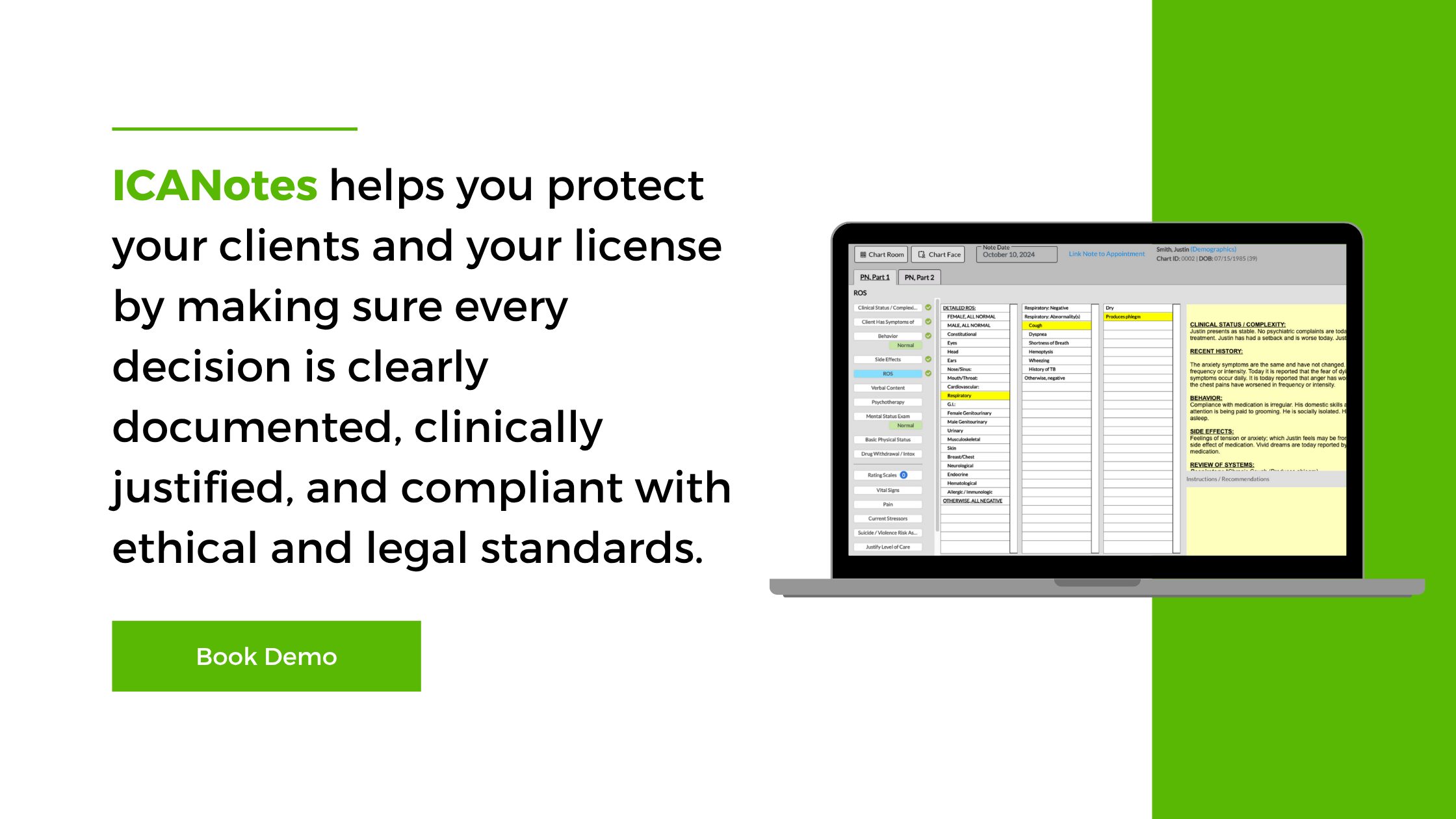Blog > Documentation > How to Properly Identify and Document Impairment
How to Properly Identify and Document Functional Impairment
Learn to identify and document functional impairments effectively to ensure treatment reimbursement and justify medical necessity for behavioral health services. Discover eight key areas to assess for impairment—including work performance, relationships, self-care, and sleep patterns—and master proper documentation techniques for progress notes. This guide also addresses when breaking client confidentiality may be necessary and emphasizes the importance of specific, detailed documentation to support insurance claims and treatment decisions.

Last Updated: May 27, 2025


What You'll Learn
- Understand the clinical definition of impairment and how it differs from general symptoms or diagnoses.
- Learn to document observable, objective evidence such as changes in daily functioning, social interactions, or work performance.
- Discover best practices for writing clear, concise, and ethically sound clinical notes that support medical necessity.
- Know when and how to document potential risk factors that may warrant breaching confidentiality to ensure client safety.
If you're a behavioral health professional, you've seen how mental health issues impact a client's life. Disorders like depression and anxiety commonly impair a person's ability to work or maintain social connections. It's critical to document any functional impairments your clients experience in their progress notes to justify that their treatment is medically necessary. This allows you to get reimbursed for your services by insurance companies and continue providing a client's treatment. You may also need proof of a clients' impairment to help them obtain disability benefits.
In this post, we'll show you what to look for when you're determining if a client has a social, emotional, or functional impairment and how to document it in your notes. We'll also talk about when breaking confidentiality is warranted.
Why It's Important to Document Functional Impairment
Documenting impairment is important because it justifies your treatment and helps you get reimbursed. Insurance companies can deny a claim if they deem a service "medically unnecessary."
What Is Medical Necessity?
The term "medical necessity" has different criteria for every insurance plan. Private insurance companies define medical necessity however they wish, as long as they are compliant with state and federal laws. Government-run programs like Medicare and Medicaid also have their own definitions of medical necessity. The Centers for Medicare and Medicaid Services, which run the federal Medicare program, describes a medically necessary service as:
- Needed for the diagnosis or treatment of a medical condition
- Meets the standards of good medical practice
- Isn't mainly for the convenience of the client or physician
Medicaid, which is run jointly by state and federal governments, varies depending on where you live. For example, according to California's Medicaid program, a mental health service may be reimbursed if it meets the following medically necessary criteria:
- The treatment is directed towards the functional impairment related to the diagnosis.
- The client has significant impairment in an important area of life functioning associated with the mental disorder diagnosis.
- The treatment will significantly diminish the impairment.
With the above standards, you would need to specifically identify critical life impairments resulting from a diagnosis to receive Medicaid reimbursement.
Overall, most insurance plans require therapy to target the symptoms of a disorder listed in the Diagnostic and Statistical Manual of Mental Disorders (DSM-5). In other words, you need to prove you are helping to relieve a client's medical symptoms, such as insomnia or anxiety, or helping them overcome an impairment. Insurance companies are unlikely to reimburse for therapy that focuses only on a client's personal growth.
What to Look for When Identifying Impairment
Impairment can be defined as a loss or reduction in ability or functioning, and it comes in many forms and with various mental disorders. Depression, for example, can impact a client's ability to perform at work or school. Some clients might experience sleep disturbances or physical complaints as a result of depression and may struggle with everyday tasks.
As a therapist, you might find some clients openly express concern about how their mental health impacts their lives. Others may be able to fulfill work or school responsibilities, but experience impairment in other less obvious areas of their lives. No matter a client's diagnosis or level of functioning, you'll always want to look for the impact their diagnosis makes. Here are factors to consider:
1. Work Habits
Mental health issues might make it difficult for a client to focus at work or feel motivated to get to a job on time — or at all. Depression may have the highest impact on work impairment compared to other disorders. It can lead to higher absenteeism, lower productivity, greater conflict and more errors than other conditions. Any of these factors might lead to unemployment or underemployment. Consider your client's work habits and ask yourself the following questions:
- Does your client miss a lot of days at work?
- Do they struggle to make it to work on time?
- Have they talked about an increase in work-related errors, accidents or poor decisions?
- Have they mentioned an inability to meet productivity requirements at work?
- Do they experience emotional outbursts at work?
- Are they struggling to maintain positive relationships with coworkers or clients?
- Are they at risk of losing their job?
- Are they struggling to find work or keep a job?

Sometimes, a client might not have any problem going to work, but they may struggle to stop working. If a client has a disorder that impacts their ability to relax and leave their work at the workplace, they might be struggling with other vital areas of their life, such as their relationships. Look for any work habits that signal an impairment resulting from a mental health issue, and document them in your progress notes.
2. Academics
If your client is a student, think about how they're performing in school. A range of mental health issues can make it challenging to concentrate and impair a person's ability to meet academic responsibilities. Consider the following:
- Has your client's attendance rate dropped?
- Are they often late for class, or have they stopped going to school altogether?
- Does your client express a lack of desire to complete homework assignments?
- Are they receiving poor grades or missing deadlines?
- Have they struggled to control their emotions in the classroom, or have they've acted inappropriately?
Your client's academic pursuits may help them achieve financial stability. For this reason, it's critical they receive treatment if a mental health issue impacts their academic performance.
3. Life Tasks
Since mental disorders affect a person's thinking, mood and behavior, they might make everyday tasks feel like a struggle. Clients with a mental health issue may feel unable to do things like pay bills, clean the house or cook meals. Without the desire or motivation to take care of personal responsibilities, a client's life can quickly feel out of control. They might fall behind on important chores that need to be completed to live in a safe, healthy environment. Here's what to look for:
- Does your client have a hard time paying bills or managing their finances?
- Do they struggle to keep their house clean and maintain their home?
- Is your client having difficulty preparing meals for themselves or family members?
- Do they neglect emails, phone calls or let their mail pile up?
- Do they resist getting medication refills or taking their medicine as directed?
Any issue that impairs a client's ability to take care of necessary tasks must be recorded in their progress notes.
4. Relationships
Mental health issues affect relationships in different ways. Sometimes a mental disorder adds stress or conflict to a client's marriage or relationship with friends or family members. Regardless, positive and supportive relationships are vital to living a healthy life. Consider your client's relationships and how they communicate with those they love, and ask yourself the following questions:
- Has the client expressed issues with their relationship with their spouse, children or parents resulting from their mental condition?
- Are they more angry, irritable or impatient around loved ones?
- Are they less interested in spending time with those they care about?
- Does your client ask family members to take on responsibilities they can no longer handle themselves?
- Does your client no longer spend time with friends, or have they struggled to make friends due to their condition?
- Have they stopped participating in social activities they used to enjoy?
Any concerns or changes your clients express regarding important relationships is another way to document their need for mental health treatment.

5. Sleeping Habits
Sleep is critical for your client's mental and physical health. If a mental health condition impairs their ability to get adequate sleep, it will impact every aspect of their life, including their job, relationships, physical health and ability to cope with stress. Some conditions like depression and anxiety make it hard for clients to get out of bed and take on the day's tasks. Any poor sleeping habits may point to an impairment. Think about the following questions and take note:
- How many hours of sleep does your client get per night?
- Does your client complain of insomnia or hypersomnia?
- Are they frequently experiencing nightmares?
- Does your client fall asleep at work or at school?
Document any sleep issues your client experiences and how often they have these problems.
6. Health
Mental health impacts physical health in numerous ways. For example, someone with depression might not feel motivated to get the exercise they need to support physical well-being or struggle to give up smoking or adopt a healthy diet. Individuals with mental disorders may be less likely to go to regular checkups, which can lead to serious health issues. Think about your client's physical health and consider the following:
- Does your client complain of headaches, body aches or stomach pain with no known physical cause?
- Is your client struggling to make or attend medical doctor appointments due to anxiety or depression?
- Are they ignoring doctor's orders?
Jot down any physical health issues your client describes that may be connected to their mental health condition.
7. Self-Care Practices
For some clients, a mental health condition makes daily self-care tasks feel like insurmountable chores. When clients stop taking care of themselves, it can impact their mental and physical health, relationships, job status and other areas of their life. Consider your client's appearance and how it might change over time. Think about the following:
- Has your client gained or lost weight?
- Is your client engaging in unhealthy eating habits, like skipping meals or binge eating?
- Does your client shower or get dressed less often than they used to?
- Have they stopped wearing makeup, brushing their hair, exercising or doing other self-care tasks they did before?
If you discover that your client's mental disorder impairs their ability to practice self-care, even if a habit seems trivial, make sure you document the impairment.
8. Use of Substances
Many individuals use drugs or alcohol to self-medicate and cope with a mental health issue, which impacts other aspects of their lives. Consider your client's habits regarding substance use and how it may be impairing their ability to function. Ask yourself questions such as:
- Has your client increased their use of alcohol, cigarettes, marijuana, prescription drugs or other substances?
- Do they express concern about their substance use?
- Is their substance use impacting their ability to maintain responsibilities at work, school or home?
- Are the client's family members worried about their drug or alcohol consumption?
Be sure to include any concerns or changes in substance use in your client's progress notes whenever the topic arises.
How to Document Functional Impairment
Make sure to clearly document any impairments your client is experiencing in their progress notes. Progress notes need to accurately represent the service you provided and prove that it is medically necessary to get reimbursed. You can follow any format you wish to write progress notes, such as SOAP (Subjective, Objective, Assessment and Plan) or BIRP (Behavior, Intervention, Response and Plan) formats, as long as you include the essential elements needed to justify care.
Regardless of the format you choose, your progress notes should establish the medical necessity of your services by ensuring the therapy addresses the condition causing the impairment and aims to benefit the client by diminishing the impairment. As you write about the impairment, you'll want to be brief and clear, but you'll also want to include important details. The more specific you can be in your notes, the better.
For example, if your client is experiencing symptoms of depression such as insomnia six nights a week, and their lack of sleep has impaired their ability to perform at work, you might say something like, "Because the client is experiencing insomnia six nights a week due to depression, they have missed eight days of work this month." Overall, you'll want to focus on specific issues with functioning and list symptoms that impact important aspects of your client's life.
Assessing and Documenting Risks That Override Confidentiality
When clients discuss symptoms they're experiencing, they might state something that requires outside attention. As a therapist, you may not always know when it's the right time to break confidentiality. Whenever you question a client's privacy rights, it's best to refer to state and federal privacy laws. For example, according to the Health Insurance Portability and Accountability Act (HIPAA), a therapist can break confidentiality if a client expresses a "serious and imminent" threat to themselves or others. As a clinician, you need to thoroughly assess and document specific risk factors to ensure client safety and comply with legal and ethical obligations. Here's a detailed guide on evaluating and recording these risk factors:
Key Risk Factors Requiring Breach of Confidentiality
1. Imminent Risk of Harm to Self (Suicidality)
Assessing a client's risk of self-harm involves evaluating several critical factors:
-
Specificity of Plan: Does the client have a detailed plan for self-harm?
-
Access to Means: Does the client have the means to carry out the plan (e.g., access to weapons or medications)?
-
Timeline: Is there a set timeframe for the intended action?
-
History of Attempts: Has the client attempted suicide in the past?
-
Protective Factors: Are there elements such as strong social support, religious beliefs, or a sense of responsibility to others that may deter the client from self-harm?
Documenting these factors comprehensively is crucial. If the risk is deemed high, therapists may need to breach confidentiality to initiate emergency interventions, such as hospitalization or contacting crisis services.
2. Threat of Harm to Others (Homicidality)
When a client poses a threat to others, therapists must evaluate:
-
Identifiability of the Target: Is there a specific person or group the client intends to harm?
-
Credibility of Threat: Does the client have a realistic plan and means to carry out the threat?
-
History of Violence: Has the client exhibited violent behavior in the past?
-
Mental State: Is the client experiencing delusions or hallucinations that may influence their behavior?
In such cases, the "duty to warn" or "duty to protect" may apply, obligating therapists to notify potential victims or law enforcement authorities to prevent harm
3. Abuse or Neglect of Vulnerable Populations
Therapists are mandated reporters and must breach confidentiality if they suspect:
-
Child Abuse or Neglect: Any form of physical, emotional, or sexual abuse, or neglect of minors.
-
Elder Abuse: Abuse, neglect, or exploitation of individuals aged 65 and older.
-
Abuse of Dependent Adults: Mistreatment of adults who are dependent due to physical or mental disabilities.
Reporting to appropriate protective services is required, regardless of whether the client is the victim or the perpetrator.
Best Practices for Documenting Risk Assessments
To ensure thorough documentation:
-
Use Structured Assessment Tools: Employ standardized tools like the Columbia-Suicide Severity Rating Scale (C-SSRS) or the Violence Risk Appraisal Guide (VRAG) to assess risk levels.
-
Detail Observations and Client Statements: Record verbatim statements that indicate risk, along with your clinical observations.
-
Note Protective Factors: Document elements that may mitigate risk, such as support systems or coping strategies.
-
Outline the Decision-Making Process: Explain the rationale behind determining the level of risk and the subsequent actions taken.
-
Record Consultations: If you consult with supervisors, legal counsel, or colleagues, document these discussions and their outcomes.
-
Maintain Confidentiality Where Possible: Only include information pertinent to the risk assessment and necessary disclosures.
Legal and Ethical Considerations
Therapists must carefully balance ethical obligations with legal requirements:
-
Know State Laws: Laws regarding the duty to warn/protect vary by state. Familiarize yourself with local statutes to ensure compliance.
-
Consult Ethical Guidelines: Refer to the American Psychological Association's Ethical Principles and Code of Conduct for guidance on confidentiality and its limits.
-
Seek Supervision: When in doubt, consult with supervisors or legal professionals to navigate complex situations.
Breaching confidentiality is a serious decision that should be made with careful consideration of the client's safety and legal obligations. By thoroughly assessing risk factors, documenting findings meticulously, and understanding the legal and ethical frameworks, therapists can make informed decisions that prioritize the well-being of their clients and others.
How ICANotes Helps Clinicians Document Impairment and Assess Risk
Accurate, timely documentation is essential when evaluating impairment or deciding whether to breach confidentiality for safety reasons. ICANotes equips behavioral health clinicians with clinically robust tools designed to streamline these high-stakes workflows and ensure thorough, defensible documentation.
Structured Clinical Note Templates
ICANotes offers specialty-specific menu-driven templates that help clinicians quickly document symptoms of functional impairment—such as changes in cognition, emotional regulation, functional capacity, or behavioral control—without missing key clinical indicators. Whether you're noting a marked decline in occupational functioning or recording disorganized thought processes, ICANotes guides you through a comprehensive assessment.
Risk Assessment Prompts and Flags
When a patient presents with suicidal ideation, homicidal thoughts, or potential for harm to others, ICANotes includes built-in fields for documenting:
-
Level of risk (e.g., low, moderate, high)
-
Protective and precipitating factors
-
Specific details of plans, means, and intent
-
Legal mandates or reporting decisions
-
Emergency actions taken (e.g., safety plan, referral, hospitalization)
These structured fields ensure clinicians address the full clinical picture, reducing the chance of documentation gaps in critical scenarios.
Integration of Standardized Tools
Clinicians can embed standardized risk assessments—like the Columbia-Suicide Severity Rating Scale (C-SSRS) or violence risk indicators—directly into the clinical record. This allows for efficient evaluation, transparent decision-making, and continuity of care across treatment teams.
Medical-Legal Compliance
ICANotes automatically timestamps and audits entries, providing a reliable legal record of your clinical judgment, supervision consults, and actions taken in real-time. These safeguards are especially important when documenting breaches of confidentiality or fulfilling mandated reporting duties.
Searchable Documentation and Clinical Alerts
All documentation is stored in a searchable format, enabling providers to track changes in risk status or impairment over time. Clinical alerts can also be configured to flag high-risk patients or trigger team follow-ups.
ICANotes doesn’t just help you write better notes—it helps you protect your clients and your license by making sure every decision is clearly documented, clinically justified, and compliant with ethical and legal standards.
Schedule a Live Demo
Experience the most intuitive, clinically robust EHR designed for behavioral health professionals—built to streamline documentation, improve compliance, and enhance patient care.
- Simplify clinical charting
- Stay organized with appointment scheduling
- Reduce no-shows with automated reminders
- Improve client engagement with a secure patient portal
- Provide flexible care with HIPAA-compliant telehealth
Simplify clinical charting
Stay organized with appointment scheduling
Reduce no-shows with automated reminders
Improve client engagement with a secure patient portal
Provide flexible care with HIPAA-compliant telehealth
Dr. October Boyles is a distinguished healthcare professional with extensive expertise in behavioral health, clinical leadership, and evidence-based care delivery. With a Doctor of Nursing Practice (DNP) from Aspen University and advanced degrees in nursing, she brings a depth of clinical knowledge and a passion for improving mental health care services.













